The TTC has accused its largest union of employees of illegal strike action for opposing the transit agency’s vaccine disclosure mandate.
The Toronto Star is reporting that the TTC filed an application with the Ontario Labour Relations Board on Tuesday afternoon, saying Amalgamated Transit Union Local 113 violated labour laws by directing its members to not share their vaccination status with management.
The application claims that the directive from the union is illegal and interferes with the TTC’s ability to “manage the public transportation system in a safe manner.”
RELATED:
The transit commission says that only 56 per cent of their employees have disclosed their vaccination status. By comparison, Metrolinx says 94 per cent of staff have provided their vaccination status to the company.
ATU Local 113 represents around 12,000 employees. The union is also calling for the resignation of TTC CEO Rick Leary.
“Since this pandemic began, the top priority of ATU Local 113 has been the health and safety of our members. Unfortunately, we have not seen the same approach taken by the TTC,” said Carlos Santos, President of ATU Local 113.
“At a time when the TTC needed strong leadership, TTC CEO Rick Leary has failed repeatedly to share vital information and negotiate in good faith with us. ATU Local 113 believes in working together to address the many challenges transit in Toronto is facing. Sadly, on a range of issues, including vaccination, Mr. Leary has shown us that he does not feel the same.”
Santos says he and the Executive Board of ATU Local 113 are asking that on or before September 30th, members comply with the vaccination status disclosure set out in the TTC’s policy.
The vaccine mandate was put in place on Sept. 7th, calling on all employees to be fully vaccinated by Oct. 30.
Metrolinx says their final mandatory vaccination policy has been distributed to all employees. The crown agency says any staff who do not provide proof of vaccination by Nov. 1 will be placed on unpaid leave.
The company says employees who were not vaccinated by Sept. 21 are required to participate in a vaccination education session. The policy applies to all staff as well as any contractors or visitors to Metrolinx sites.
Of the 94 per cent of Metrolinx staff that have disclosed their vaccination status to the company, only four per cent are not yet fully vaccinated.
The mandates from the TTC and Metrolinx followed a similar mandate from the City of Toronto that made vaccinations mandatory for all municipal employees.
Both the city and the TTC said employees would be exempt from the vaccine policy if they could provide proof of a medical reason for not being immunized.
“I believe that every individual has the inherent right to determine their own medical treatment. This is reflected in the Occupational Health and Safety Act and the Health Care Consent Act and protected by the Charter,” Santos added.
“I also believe that we have a responsibility to support and protect each other and to the public – and to work together to resolve conflict.”
The ATU Local 113 President says the last 18 months have often been “chilling” for TTC employees.
“Those members deserve respect, information and fairness from their employer. I believe these issues can be resolved through open, honest dialogue,” he said.
“I call upon the TTC to abandon their strategy of confrontation and work collaboratively with us to find solutions that work for our members and work for Toronto.”
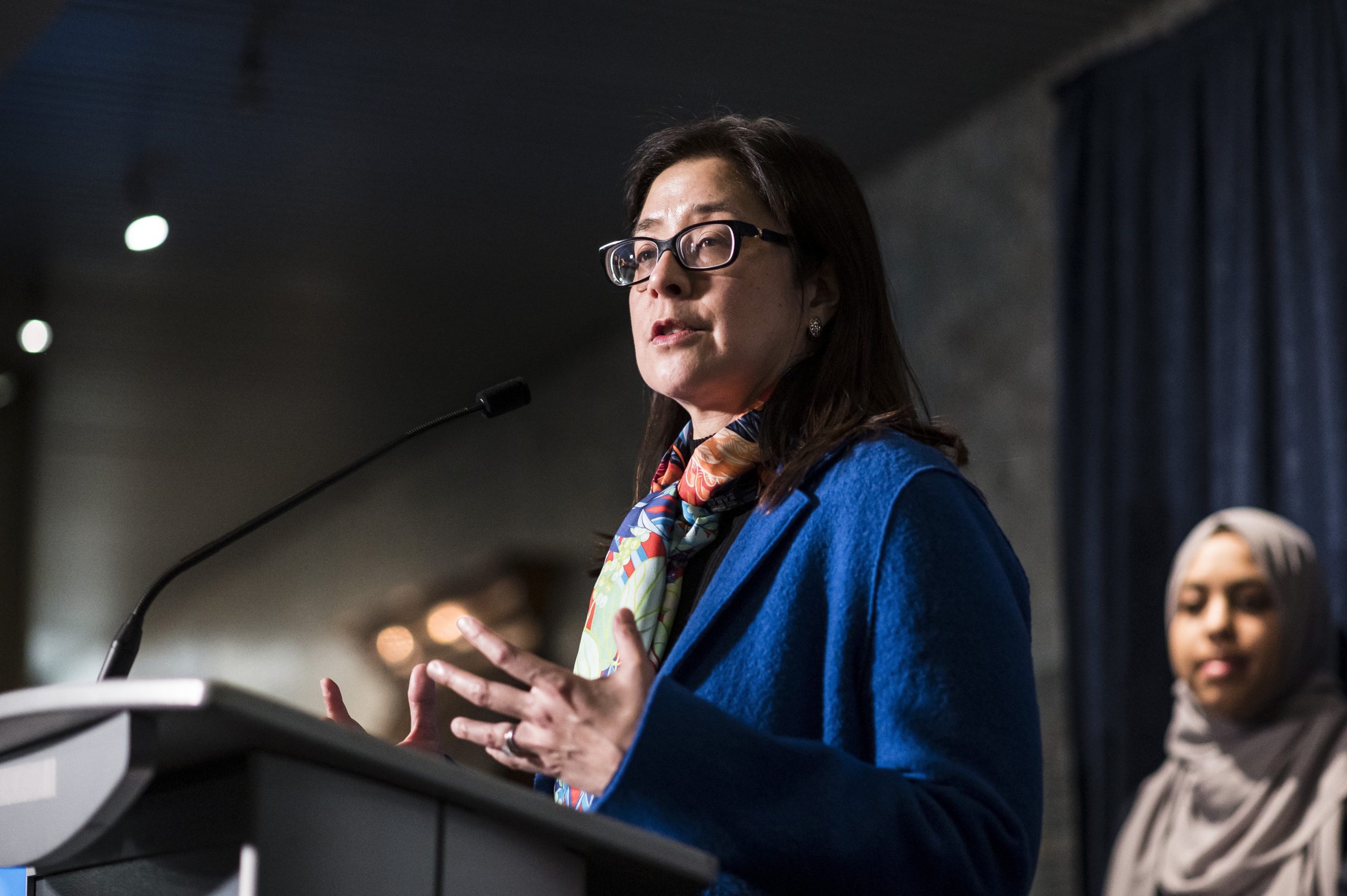
Toronto’s top doctor is asking us again to not hold large Thanksgiving gatherings.
Dr. Eileen de Villa says the risk of spreading COVID-19 still exists.
This comes as the province reports fewer than 500 new daily cases for the second day in a row, 107 new infections reported in Toronto on Wednesday.
“It’s too bad, we have to urge caution again. But once more this year, caution is a must. I hope that next year, we’ll really have something to celebrate,” de Villa says.
De Villa says even though our current case counts have been steady or dropping, it’s still too soon to let our guards down.
“So for the foreseeable future, choose wisely, carefully, and selectively, when it comes to getting together and celebrating. Wear your mask and keep your distance when in public, and especially in crowds, and when indoors,” she says.
De Villa says 189,000 people who are in the 30 to 49 year old age group have yet to get vaccinated, and she’s encouraging them to get the shot to not only protect themselves, but also their families and friends.
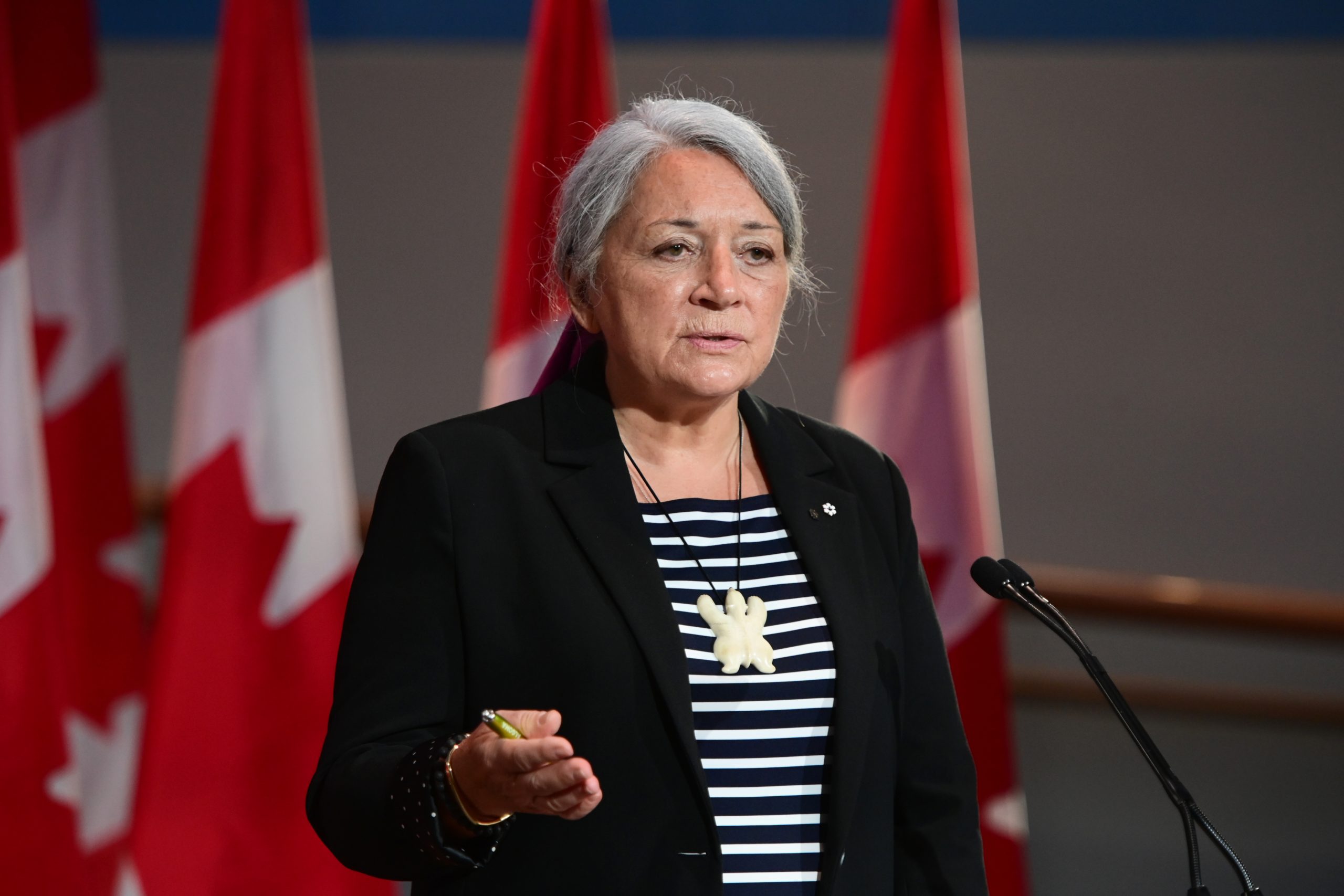
OTTAWA — Governor General Mary May Simon has some very personal reflections on the eve of Canada’s first National Day for Truth and Reconciliation.
As the daughter of a white father and Inuk mother, May Simon says in a statement that she was not made to attend a residential school.
She stayed behind and was home-schooled while other children were ripped away from their homes, separated from their families and sent to residential schools where they were not allowed to speak an Indigenous language or honour their culture.
May Simon, who was born in an Inuit village in northern Quebec, recalls visiting families where the absence of children was a “palpable void.”
She says she became a “stand-in, a well-loved substitute” for parents who desperately missed their own children.
Residential school survivors told their stories at a ceremony Wednesday night on Parliament Hill ahead of the inaugural Truth and Reconciliation Day.
Prime Minister Justin Trudeau says he applauds the courage of residential school survivors and that it cannot be easy for them to tell their stories.
At the ceremony on Parliament Hill ahead of the inaugural Truth and Reconciliation Day, Trudeau said reconciliation simply doesn’t mean looking back and understanding the mistakes made in the past but realizing that they are shaping the country even today.
He says while Canada is seen as a peace-loving place that respects the rights of people, it is also a country that has made huge and terrible mistakes.
The prime minister says the challenges facing First Nations such as injustice, inequality, discrimination and racism can be traced back to the decisions made decades ago.
Trudeau says it behooves everyone to listen to the experiences of residential school survivors and know that they are every Canadian’s story.
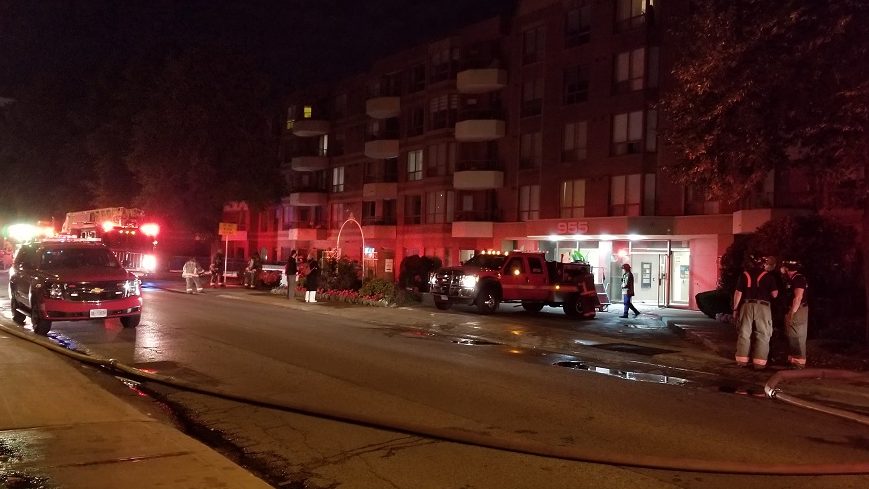
A woman has critical injuries after a two-alarm fire at an apartment building in East York.
Fire crews were called to the building on Millwood Road near the Don Valley Parkway just after 1 a.m. on Wednesday, for a fire in a first-floor unit.
Paramedics said the woman, believed to elderly, was rushed to a trauma centre. Her exact age is not yet known.
A fire official at the scene said the building is largely occupied by seniors, and that the fire alarms were working.
The Ontario fire marshal’s office is investigating.
At one point, the building was partially evacuated but the residents have since been allowed back in.
No other injuries were reported.
The fire has since been put out, but crews are conducting ventilation tests.

Thirty-nine miners who had been trapped underground in northern Ontario have returned to the surface safe, the company that owns the mine said Wednesday.
Vale said the rescue operation at Totten Mine near Sudbury, Ont., is complete.
“I’d like to congratulate our rescue team,” said Vale CEO Eduardo Bartolomeo in a statement.
‘Bringing our 39 employees home safe and healthy was our top priority and we’re glad that our emergency plans and procedures worked to deliver that outcome. All the employees are safe now and deserve our deep respect for their perseverance and strong will.”
The workers became trapped in the mine on Sunday when a scoop bucket being sent underground detached and blocked the mine shaft.
Some of the miners were trapped as deep as 1,200 metres below the surface, the company said.
They had to scale a series of ladders to climb out of the mine and were helped along by a rescue crew.
The rescue operation began on Monday night.
A team of 58 responders from the company’s rescue team and the Ontario Mine Rescue agency helped the trapped workers through their long trek up the ladder system, the company said.
‘This is tremendous news flowing from very difficult circumstances,” Bartolomeo said from the mine.
“All of us at Vale were focused on and committed to the safe return of our employees underground.”
Bartolomeo said the company will launch an investigation into what happened “so that the company can learn from it and take steps to ensure it never happens again.”
Vale said the workers stayed in underground “refuge stations” and had access to food, water and medicine before climbing out.
The province’s Ministry of Labour, Training and Skills Development said an inspection team will investigate the incident.
Totten Mine opened in 2014 in Worthington, Ont., and produces copper, nickel and precious metals. It employs about 200 people.

Summary
The new guidance was released Tuesday after reviewing evidence about waning immunity from the vaccine
NACI recommends long-term care residents and people living in seniors’ homes receive another shot of an mRNA vaccine
NACI says there are signs that vaccine protection might not last as long for seniors in congregate settings like LTC
The National Advisory Committee on Immunization is urging long-term care homes to give boosters to residents immediately, as the Delta variant breaks out in facilities across the country.
The new guidance was released Tuesday after the committee reviewed evidence about waning immunity from the vaccines, the latest safety data and the spread of COVID-19 across the country.
The committee recommends long-term care residents and people living in seniors’ homes receive another shot of an mRNA COVID-19 vaccine — like Pfizer-BioNTech or Moderna — as long as it has been six months since their last shot.
A booster dose of a viral vector vaccine like Oxford-AstraZeneca is only recommended when Pfizer or Moderna vaccines are unavailable or the person can’t have an mRNA vaccine for medical reasons.
“At this time, boosters are not necessary for most of the population, but we want to be sure to address early signs of waning among seniors residing in these settings where shared and close living spaces increase the risk of exposure,” chief public health officer Dr. Theresa Tam wrote in a statement.
NACI says there are signs that vaccine protection might not last as long for seniors in congregate settings like long-term care as it does for other populations in Canada.
Canadian studies have suggested that even though people in long-term care had a good initial antibody response to two doses of vaccine, the majority of residents did not have a detectable level of antibodies against the Delta variant six months later.
“While the vaccines initially worked very well to protect this group, we are starting to see signs of outbreaks again in long-term care settings and we are looking to prevent the level of severe outcomes this population experienced early in the pandemic,” NACI chair Dr. Shelley Deeks wrote in a statement.
Right now, 260 long-term care and retirement homes are battling active outbreaks of COVID-19 in Canada, according to a tracker developed by the National Institute on Aging.
That’s up from just 201 long-term care outbreaks last week.
Half of those outbreaks are happening in Alberta, which is dealing with a spiralling health crisis during the latest wave of the pandemic.
Long-term care has borne the brunt of the COVID-19 pandemic in Canada, where aging residents and congregate living proved to be a tragic combination.
About 69 per cent of Canada’s total pandemic-related deaths happened in long-term care homes as of February 2021, according to the Canadian Institute for Health Information.
The new advice comes weeks after provinces like Ontario announced they would extend third-dose eligibility to long-term care residents.
Saskatchewan, Alberta, and most recently, Quebec are also offering boosters to residents in care homes, while Manitoba has extended third doses to long-term care residents in First Nations.
NACI has previously recommended boosters for people who are moderately to severely immunocompromised, as evidence shows some immunocompromised people have a lower immune response to COVID-19 vaccines compared to others.

Ontario seems to have a handle on COVID-19 for the time being, with no marked increases in cases, hospitalizations, and ICU occupancy, but the situation will be “fragile” as colder weather approaches, forcing more people indoors.
That’s the conclusion drawn by the province’s science advisory table in its latest round of projections released Tuesday.
The table released a wide range of possible scenarios with “high uncertainty” in estimates because it’s too early to see the full impact of the return to schools and workplaces and how spending more time indoors will contribute to the spread of the virus.

If there’s a 25 per cent increase in transmission, daily case counts would soar over 5,000 by November. If things remain the same, with no changes in policies or behaviour, daily cases would rise to slightly more than 1,500. A 25 per cent reduction in transmission would see cases drop well below current levels. (see chart above).
Ontario reported 466 new COVID-19 cases and 11 additional deaths on Tuesday. The rolling seven-day average of new cases has dropped to 606, down from 710 one week ago.
The science table confirms that test positivity rates are currently in a decline.

The science table says vaccination coverage is increasing slowly, and continued control over case growth will require high vaccination rates along with continued public health measures and decreases in mobility.
“Unvaccinated people have a seven-fold higher risk of symptomatic COVID-19 disease, a 25-fold higher risk of being in the hospital and 60-fold higher risk of being in the ICU compared to the fully vaccinated,” it found.

Ontario hospital and ICU occupancy rates have been stable for several weeks, but by the end of October estimates vary from under 200 beds to over 300 beds.
Patients in ICU are also expected to be younger in comparison to previous waves.

“The risk of contracting COVID-19, being hospitalized for COVID-19, and entering the ICU is several times higher for unvaccinated individuals,” the table states, adding that people will long-term lingering effects from COVID-19 will “substantially impact the health of thousands of Ontarians.”
In a statement, a spokesperson for the Minister of Health said that the new modelling numbers further reinforce that the province’s public health measures are working.
“Ontario continues to report one of the lowest rates of active cases in the country, well below the national average, as we have trended toward the best-case scenario projected in the last modelling,” said Alexandra Hilkene. “The implementation of vaccine certificates in higher-risk settings will help protect the province’s hard fought progress. We are seeing the impact of this policy, with thousands more rolling up their sleeves for first and second doses each and every day.”
“In the months ahead, we will maintain our cautious approach and continue to make decisions based on the best medical and scientific advice.”
Welcome to WordPress. This is your first post. Edit or delete it, then start writing!
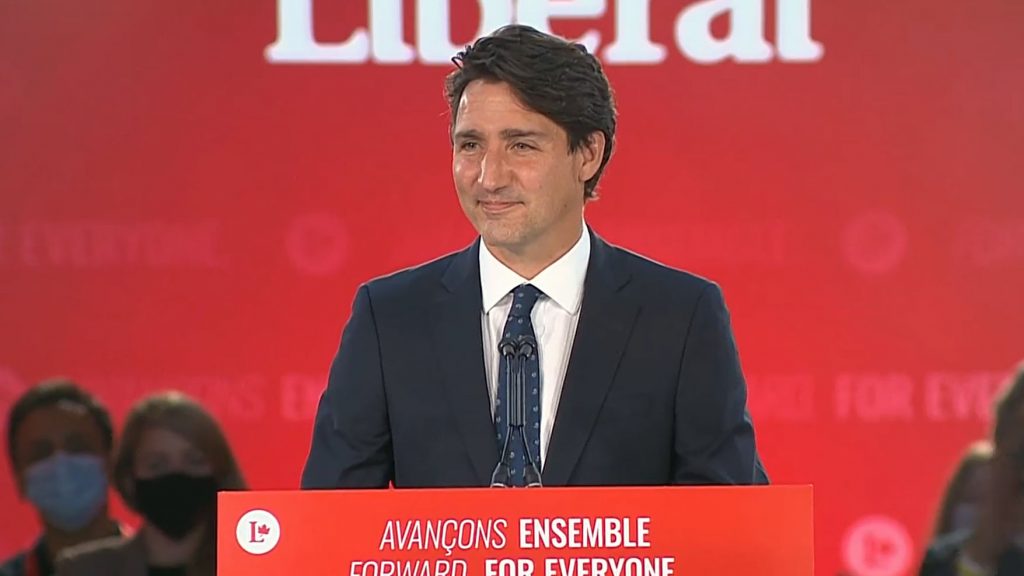
Summary
10% of respondents said they’re happy with the outcome, which produced another Liberal minority government
But another 24 per cent said they’re comfortable with the outcome
12 per cent said they’re angry about the outcome and six per cent said they’re uncomfortable with it
Canadians may not be thrilled with the outcome of last week’s federal election but a new poll suggests few are angry that it produced an almost identical result to the 2019 nation-wide vote.
Just 10 per cent of respondents to the Leger survey said they’re happy with the outcome, which produced another Liberal minority government led by Justin Trudeau and only minor changes to the seat counts of all the parties.
But another 24 per cent said they’re comfortable with the outcome, while nine per cent said they prefer a minority government in any event and 14 per cent said they’re indifferent.
On the flip side, 12 per cent said they’re angry about the outcome and six per cent said they’re uncomfortable with it. Another 24 per cent said they’re unhappy about it “but life goes on.”
Conservative Leader Erin O’Toole has lambasted Trudeau for calling an unnecessary, $610-million election that changed nothing, all in the midst of a deadly fourth wave of the COVID-19 pandemic.
However, the poll, conducted Sept. 24-26, suggests Canadians are more sanguine about the result, possibly because they’re lukewarm about O’Toole’s leadership.
The online survey of 1,537 Canadians cannot be assigned a margin of error because internet-based polls are not considered random samples.
It suggests that O’Toole was less of an asset for his party than either Trudeau or NDP Leader Jagmeet Singh.
Just 23 per cent of those who voted Conservative said they did so because of the leader. Forty-nine per cent said they voted for the party itself while 28 per cent said they voted for their local candidates.
Among Liberal voters, 34 per cent voted for the leader, 41 per cent for the party itself and 25 per cent for their local candidates.
Among New Democrats, 38 per cent voted for the leader, 38 per cent for the party and 24 per cent for their local candidates.
Both O’Toole and Singh have faced some calls from within their own ranks to step down after their respective parties’ disappointing finish. The Conservatives lost two seats, although they won slightly more of the popular vote than the Liberals, while the NDP gained one seat, remaining firmly stuck in fourth place.
Among Conservative respondents, 49 per cent said they want O’Toole to remain at the helm of the Conservative party. But a majority said either that they want him to go (22 per cent) or didn’t know (29 per cent) if he should stay or go.
By contrast, 82 per cent of NDP respondents said they want Jagmeet Singh to remain as leader of the New Democratic Party.
Among Liberals supporters, 25 per cent said the main reason they voted Liberal was to avoid a Conservative government. Twenty-three per cent said they thought Trudeau was the best leader to lead the country and another 23 per cent said they thought the party best represented their values.
Among Conservative supporters, 39 per cent said they voted primarily to get rid of the Liberal government, 21 per cent backed the party they thought best represented their values and just 14 per cent chose the Conservatives because they thought O’Toole was the best leader.
Among NDP respondents, 48 per cent said the voted primarily for the party that best represented their values, just 14 per cent because they thought Singh was the best leader for the country.
In Quebec, 35 per cent of Bloc Quebecois supporters said they voted for the party they thought was best positioned to defend Quebec’s interests. Another 14 per cent said they wanted a strong opposition party in a minority government while 11 per cent voted because of Leader Yves-Francois Blanchet.
Just seven per cent of Bloc supporters said they backed the party because of a question posed by the moderator of the English-language leaders’ debate, which Blanchet claimed suggested Quebecers are racist.
Still, the poll suggests the Bloc did get a bump from the English debate. Thirty per cent of Bloc supporters said they made up their minds how to vote in the days following the debates — compared to just 15 per or less for supporters of the other major parties.
Overall, 49 per cent of respondents said they made up their minds before the campaign even started, 18 per cent in the opening two weeks, nine per cent over the final weekend and eight per cent on election day.
Just six per cent said the debates changed their minds about who to vote for. Fifty-five per cent said they didn’t pay attention to them, while 39 per cent said the debates confirmed their previous choice.
Fully 83 per cent said they ultimately voted according to their original choice; 17 per cent said they switched parties over the course of the campaign.
In the end, 73 per cent said they voted primarily for the party they liked best. But 27 per cent said they mainly voted strategically to stop another party.
Among respondents who didn’t vote, 29 per cent said they were indifferent about the election, 24 per cent said they didn’t think their vote would change anything.
Other reasons given for not voting were physically or mentally incapable (13 per cent), the polling location was too far away (10 per cent), wait times were too long (nine per cent), afraid to show up because of the pandemic (nine per cent) and didn’t know where to go to vote (six per cent).
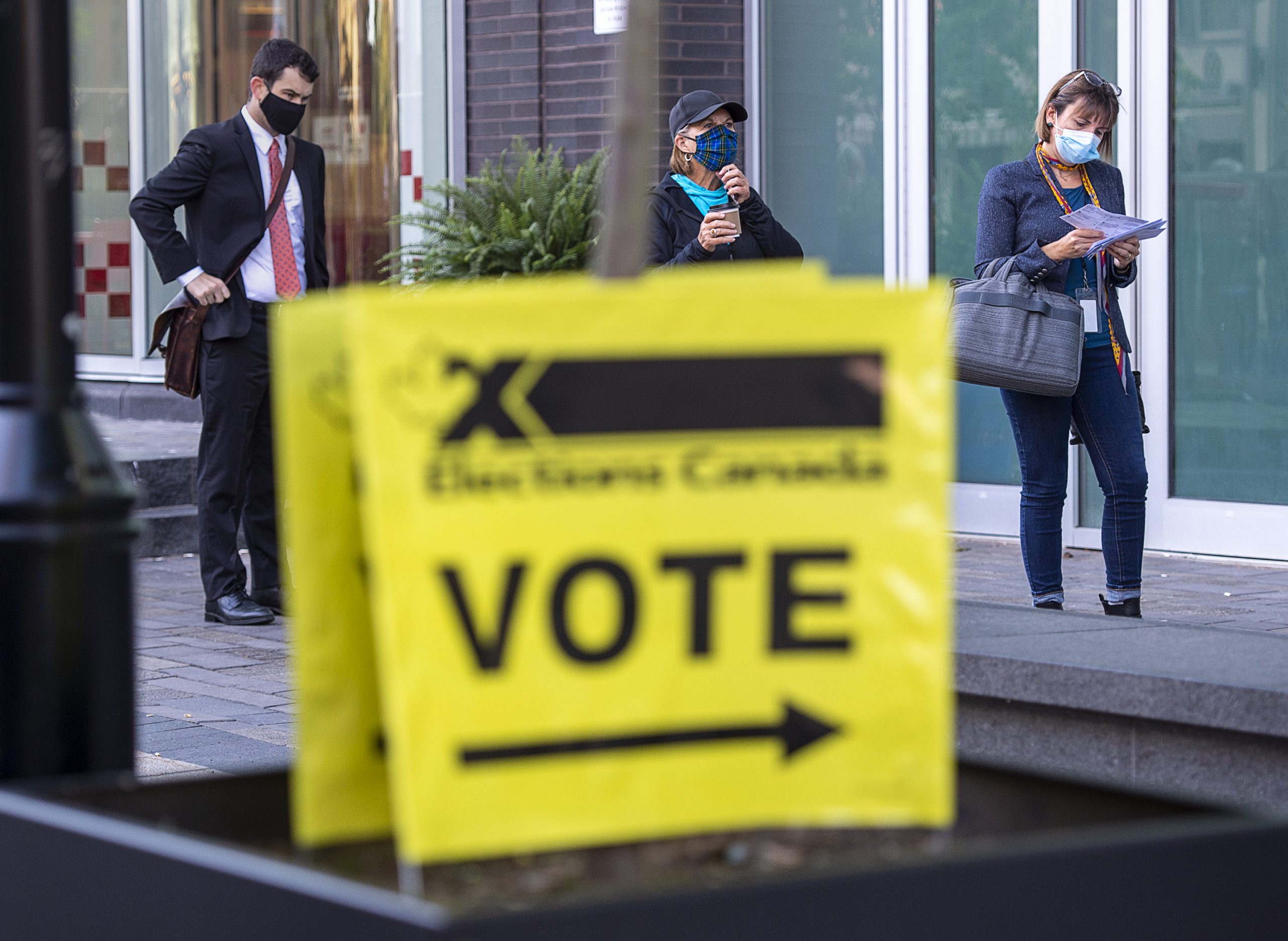
OTTAWA — Sixty-two per cent of eligible voters cast ballots in last week’s federal election — about average turnout for recent Canadian elections despite the challenges of the COVID-19 pandemic.
Elections Canada says almost 17 million Canadians voted, out of 27.4 million eligible electors. That does not include voters who registered on election day so the final number could tick up a bit, the agency says.
Turnout was down from 67 per cent in 2019 and 68.3 per cent in 2015 but it was still better than four of the previous seven federal elections held in Canada since the turn of the century.
The pandemic resulted in fewer polling locations, fewer poll workers and long lineups to vote last Monday in some places.
It also resulted in a record number of Canadians — some 850,000 — voting by mail.
Election officials completed counting the mail-in ballots on Saturday.
Elections Canada expected to finish validating the results in all ridings on Monday, after which candidates in close-fought ridings will have four days to request a judicial recount.
The Liberals served notice late Monday that they are seeking a judicial recount in the Quebec riding of Chateauguay-Lacolle, where the Bloc Quebecois’ Patrick O’Hara edged out Liberal incumbent Brenda Shanahan by just 286 votes.
Justin Trudeau’s Liberals emerged from the election with a second minority government, having won 159 seats, a gain of two over their 2019 result.
However, the winner in one of them — Kevin Vuong in Toronto’s Spadina-Fort York — will sit as an independent after failing to disclose to the party a past sexual assault charge, which was later dropped.
Erin O’Toole’s Conservatives finished with 119 seats, down two from 2019. The Bloc Quebecois finished with 33 seats (up one), the NDP with 25 (up one), and the Greens with two (down one).
The Conservatives won slightly more of the popular vote — 33.7 per cent to the Liberals’ 32.6 per cent — as they did in 2019. But because their vote was heavily concentrated in Alberta and Saskatchewan, they won fewer seats.
The NDP’s share of the vote was up almost two points over 2019, to 17.8 per cent. The Bloc’s share was down slightly to 32.1 per cent in Quebec.
The Greens won just 2.3 per cent of the vote, less than half their share in 2019 and behind the extremist fringe People’s Party of Canada, which took five per cent of the vote although it won no seats.
This report by The Canadian Press was first published Sept. 27, 2021.


















